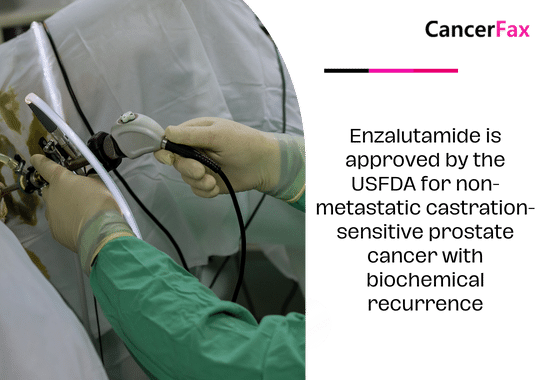Enzalutamide is approved by the USFDA for non-metastatic castration-sensitive prostate cancer with biochemical recurrence
The FDA has authorized enzalutamide for the treatment of non-metastatic castration-sensitive prostate cancer in cases of biochemical recurrence.
The Food and Drug Administration approved enzalutamide (Xtandi, Astellas Pharma US, Inc.) for non-metastatic castration-sensitive prostate cancer (nmCSPC) with biochemical recurrence at high risk for metastasis (high-risk BCR) on November 16, 2023.
The effectiveness was assessed in EMBARK (NCT02319837), a randomized, controlled clinical study involving 1068 patients with non-metastatic castration-sensitive prostate cancer and high-risk biochemical recurrence. All patients had undergone radical prostatectomy and/or radiation with curative intent before, had a PSA doubling time of 9 months or less, and were not eligible for salvage radiotherapy when they joined the study. Participants were randomly assigned in a 1:1:1 ratio to receive either enzalutamide 160 mg once daily together with leuprolide in a blinded manner, enzalutamide 160 mg once daily as a single agent in an open-label manner, or a blinded placebo once daily along with leuprolide.
The primary outcome studied in the study was metastasis-free survival (MFS), evaluated by an impartial central review, comparing enzalutamide with leuprolide to placebo plus leuprolide. Additional efficacy outcome measures were the median failure-free survival (MFS) for enzalutamide monotherapy compared to placebo + leuprolide and overall survival (OS).
Enzalutamide plus leuprolide showed a statistically significant improvement in metastasis-free survival compared to placebo plus leuprolide, with a hazard ratio of 0.42 and a p-value of less than 0.0001. Enzalutamide monotherapy showed a statistically significant improvement in metastasis-free survival compared to placebo plus leuprolide, with a hazard ratio of 0.63 (95% CI: 0.46, 0.87; p-value = 0.0049). During the MFS analysis, the OS data were incomplete, showing a 12% mortality rate in the total population.
Common side effects (≥ 20% incidence) in individuals treated with enzalutamide in combination with leuprolide were hot flush, musculoskeletal pain, weariness, fall, and bleeding. Common side effects of enzalutamide monotherapy include weariness, gynecomastia, musculoskeletal pain, breast tenderness, hot flush, and bleeding.
The suggested enzalutamide dosage is 160 mg taken orally once a day, with or without food, until illness progression or unacceptable toxicity. Enzalutamide can be given with or without a GnRH analog. Enzalutamide medication may be stopped if PSA levels are below 0.2 ng/mL after 36 weeks of therapy. Treatment can be restarted when PSA levels reach > 2.0 ng/mL for individuals who underwent radical prostatectomy or ≥ 5.0 ng/mL for those who have primary radiation therapy.
Susan Hau is a distinguished researcher in the field of cancer cell therapy, with a particular focus on T cell-based approaches and cancer vaccines. Her work spans several innovative treatment modalities, including CAR T-cell therapy, TIL (Tumor-Infiltrating Lymphocyte) therapy, and NK (Natural Killer) cell therapy.
Hau's expertise lies in cancer cell biology, where she has made significant contributions to understanding the complex interactions between immune cells and tumors.
Her research aims to enhance the efficacy of immunotherapies by manipulating the tumor microenvironment and exploring novel ways to activate and direct immune responses against cancer cells.
Throughout her career, Hau has collaborated with leading professors and researchers in the field of cancer treatment, both in the United States and China.
These international experiences have broadened her perspective and contributed to her innovative approach to cancer therapy development.
Hau's work is particularly focused on addressing the challenges of treating advanced and metastatic cancers. She has been involved in clinical trials evaluating the safety and efficacy of various immunotherapy approaches, including the promising Gamma Delta T cell therapy.
- Comments Closed
- March 3rd, 2024






Androgen receptor inhibitor breakthrough, Biochemical recurrence treatment, Castration-sensitive therapy, Enzalutamide approval, FDA-approved prostate drugs 2024, Non-metastatic prostate cancer, PSA progression management, Xtandi for nmCSPC
CancerFax is the most trusted online platform dedicated to connecting individuals facing advanced-stage cancer with groundbreaking cell therapies.
Send your medical reports and get a free analysis.
🌟 Join us in the fight against cancer! 🌟
Привет,
CancerFax — это самая надежная онлайн-платформа, призванная предоставить людям, столкнувшимся с раком на поздних стадиях, доступ к революционным клеточным методам лечения.
Отправьте свои медицинские заключения и получите бесплатный анализ.
🌟 Присоединяйтесь к нам в борьбе с раком! 🌟